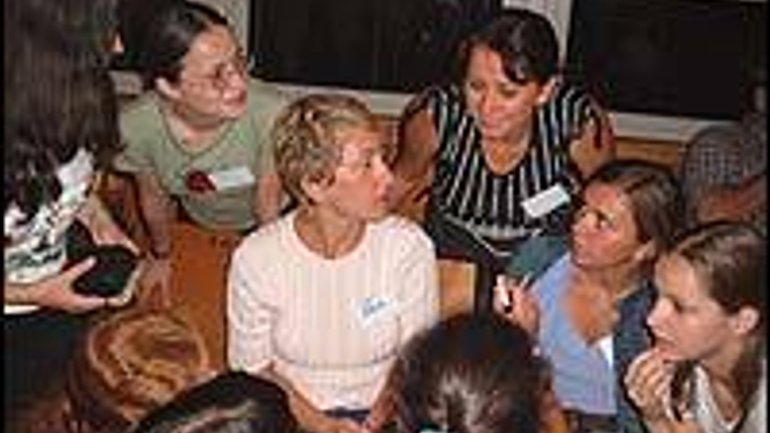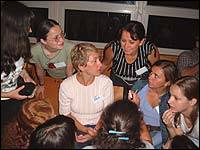Christian values in Ukraine’s educational context

 Oleksandr VIALOV on Christian education in Ukraine
Oleksandr VIALOV on Christian education in Ukraine
“Prime-ministers can only be envious of the influence of school teachers on the nation.”
Winston Churchill
The Chinese maintain that the worst misfortune (for a Christian audience, trial) for a person or nation is to live “in an age of changes.” Without going into detail, I will dare to state that both Ukraine and the European community, on the whole, are presently exactly in such a historical period. The contradiction of an “age of changes” is reflected, on one hand, in “the negative,” namely, the rapidity of political and social transformations causing instability of life, and, on the other hand, in “the positive,” of a wide spectrum of opportunities opening at a time when previous stereotypes are already ruined and new ones are only being created. The project described below probably was to be born exactly at such a time.
As we know, market diversity has taken over not only the sphere of production, but also of services, particularly education. In 1988, the first private school was established in Ukraine and, later, the number of private educational establishments (both general education and higher education institutions) increased and now totals a few hundred. However, the very palette of private education represents different philosophies and worldview systems, reflecting, on the one hand, the internal bents of the founders and managers of educational institutions and, on the other hand, the orientation to the social stratum of the “consumers,” the parents and students. It is only natural that adherents of the same philosophy, worldview system, and system of values are interested in an exchange of experience, innovations, mutual enrichment and, what is more, are looking for opportunities to make themselves known in society.
It is for this reason that on 10 September 2002 a project was launched with the assistance of the civic educational organization OGO (Netherlands), the civic organization Cultural-Educational Center for the Promotion of the Development of Christian Culture (Ukraine). In this project eight private schools from various regions of Ukraine found a good opportunity for integration. The cooperation brought together eight schools whose educational philosophy is oriented to the realization of the ideas of Christian morality and values, namely Siaivo [Shine] (Zhytomyr), Nadia [Hope] (Chernivtsi), Rika Zhyttia [River of Life] (Kyiv), Vidrodzhennia [Rebirth] (Kharkiv), Gloria (Donetsk), Raiduha [Rainbow] (Odesa), Stezhynka [A Small Step] (Izmail), and Pochatok Mudrosti [Beginning of Wisdom] (Kharkiv).
The project provided for a number of ways to establish communication between the participant schools (and, at the same time, members of the Cultural-Educational Center) through “Internetization,” that is, the establishment of a website and e-mail box for each school. Identification of educational innovations for the exchange of experience was the next step. But the main results of the cooperation were probably attempts to “emerge from underground” in the format of an annual conferences for teachers and students and periodic publishing of a magazine “Christian Education in Ukraine.” (It is planned to publish it in future under the new name “Christianity and Education.”) It is also quite notable that the Dutch side did not dictate “the rules of the game” to the Ukrainian participants even though it took an active part in supporting the project both financially and conceptually. (Lecturers from Holland have spoken at conferences for teachers and students more than once). What is more, the extent of independence in making certain decisions sometimes caused a sense of awkwardness. (Some of us are so used to working according to the principle “we did what we were told.”)
It is probably worth noting what kind of schools these are. First of all, the managers and a considerable part of the personnel thereof are people who profess Christianity theoretically and practically. One could stress their denominational identity, but this is not our subject now. The famous D. Mendeleyev once expressed the idea that “education without upbringing is a sword in a madman’s hands.” And, despite the fact that we talk a lot about upbringing (even the very process is called “instructional-educational”), the reality shows that the scale inevitably tends to the “instructional” pan. For it is easier to deal with: each subject is provided with a program, textbook, schedule and a specialist… Dealing with education is more complicated (or maybe, on the contrary, easier?), because there is no established system of values, no established single worldview, and, therefore, having left the times of “Young Pioneers and Komsomol [Communist Youth]” in the past, the school found itself at the cross-roads of value disorientation. So, as an acquaintance of mine said, “upbringing was replaced by educational measures: there are many measures but little education.” There is no doubt that the pluralism of thoughts and denial of the totalitarian monolith is an undeniable achievement of the last decade, but what exactly do we have instead, which values do we deliberately assume as the basis, what do we foster and struggle for at school? That is why the schools of the Cultural-Educational Center decided to unite within the framework of this project in order to make the values which were tested by the most severe survival test of time known not only in their environment but also in the external cultural space. Christian values save one from having “to discover America” and “to invent the bicycle” in matters of education. These values actually are the “all-human” ones which we seem to know about, but, for some reason, we are embarrassed to be consistent and frankly state where they originate from and who their Author is…
That is exactly why the center organized conferences of the following titles for teachers and future pedagogues, the students:
– The interrelation between spiritual and academic truths
– The role of Christian education in the modern world
– Christianity and education: Conflict or concord?
– Professional ethics of the teacher
Lecturers were mostly “ours,” that is, Ukrainian, but neither were “theirs” ignored. The latter included outstanding speakers. For example, Rinus Hautman, who once was a regional minister of education in the Netherlands. In addition to conferences, we attempted to deal with these questions in the magazine (despite the modest design and circulation it has so far). Of course, the real activity of the center and the participant schools was not limited to the mentioned activities. We organized work on exclusively instructional aspects, such as creation of school books for individualization of study, adaptation work with children having special educational needs, and seminars on mastering modern information technologies with the participation of experts from Ukraine and the Netherlands.
Frankly speaking, there is no sense of euphoria, and “breath-taking success.” As we take a sober view of the achievements, we realize that it is only the first step and there are many outstanding tasks ahead. It is also clear that, despite the fact that eight schools is better than one or two, their efforts in the spreading and actualization of Christian values in education are not enough, to put it mildly… Therefore, the Cultural-Educational Center for the Promotion and Development of Christian Culture and Education invites to cooperation everyone whose concern about the morality of modern youth and spirituality exceeds formal declarations, for the way of integration is the only possibility to do something really significant and capable of changing the face of the society in which we live for the better…
Postscript: Persons wishing to work together with the center can directly contact the director, Oksana Topolnytska: e-mail: [email protected], tel: +38 096 3448095, 8 0412 427451.
Address of the Center: city of Zhytomyr 10001, Novohoholivska Street, 11
Oleksandr Vialov is director of the private school Beginning of Wisdom in the city of Kharkiv and assistant to the head of the Cultural-Educational Center for the Promotion of the Development of Christian Culture and Education
This text was posted on RISU’s Ukrainian-language site on 5 December 2005.









